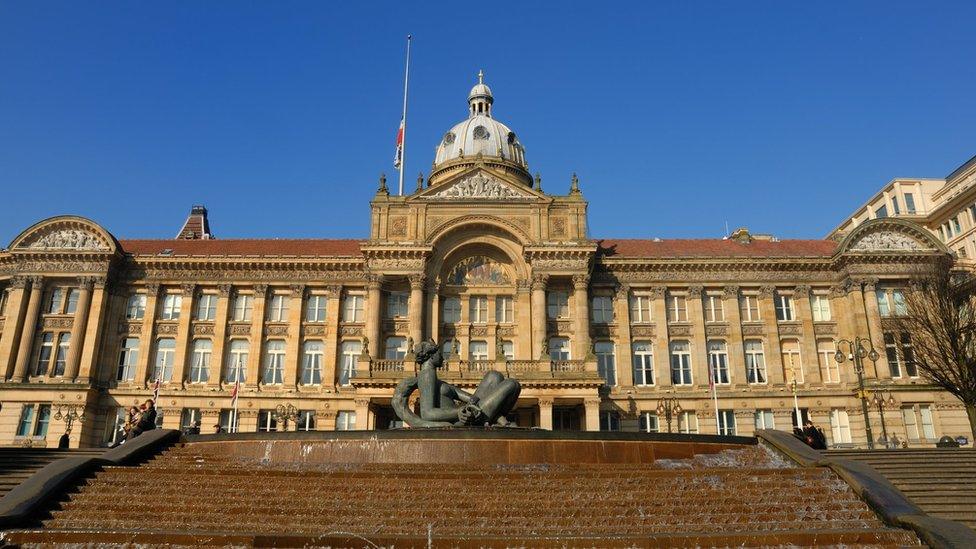Government sending in officials to run Birmingham City Council
- Published
- comments

Michael Gove has announced he will appoint commissioners to take over Birmingham City Council
Emergency measures to help run Birmingham City Council during its financial crisis have been announced by the government.
Commissioners will oversee the effectively bankrupt authority, with powers to make decisions directly.
Levelling Up secretary Michael Gove told the Commons bosses at the Labour-run council had "harmed the city".
West Midlands mayor Andy Street suggested the authority could sell its stake in Birmingham Airport.
The "asset rich" council could also raise funds by disposing of some of the 40% of the land in the city that it owns, he added.
Mr Gove said a local inquiry into the financial crisis would be launched.
'Woeful mismanagement'
The authority is facing the prospect of a £760m bill to settle equal pay claims.
It has also warned the bill is increasing by £5m to £14m each month.
The government was prepared to extend additional financial support to the city, Mr Gove said, but he warned of "tough decisions" ahead, with a hike in council tax and a sale of assets each a possibility.
"Poor leadership, weak governance, woeful mismanagement of employee relations and ineffective service delivery have harmed the city," Mr Gove told Parliament.
"I do not take these decisions lightly, but it is imperative in order to protect the interests of the residents and taxpayers of Birmingham, and to provide ongoing assurance to the whole local government sector."

Andy Street, mayor of the West Midlands, said the situation in Birmingham was an "avoidable tragedy"
The commissioners, he confirmed, would have the means to make decisions directly, if needed, and the inquiry would consider "the more fundamental questions" of how the city got into its position.
The council had to prepare, and agree, an improvement plan within six months but had only five working days to make representations, Mr Gove announced.
Responding in the Commons, Angela Rayner, shadow Levelling Up secretary, said a "crisis" in local government had been caused by "the Conservatives' wrecking ball".
"With every swing, another local council is pushed to the brink and another local community falls over the edge," she said.
"And this isn't a one-off. So can I ask [Mr Gove] what work his department is doing to support local authorities that are warning of financial distress now?"
The leader of Birmingham's administration, John Cotton, said the authority would now work with the government to get the council back on "a sound financial footing".
He had been concerned there was a lack of senior capacity at the council "to deal with the issues that we faced", he posted on X, formerly Twitter.
The council is also facing a projected deficit of £87m in this year's budget.
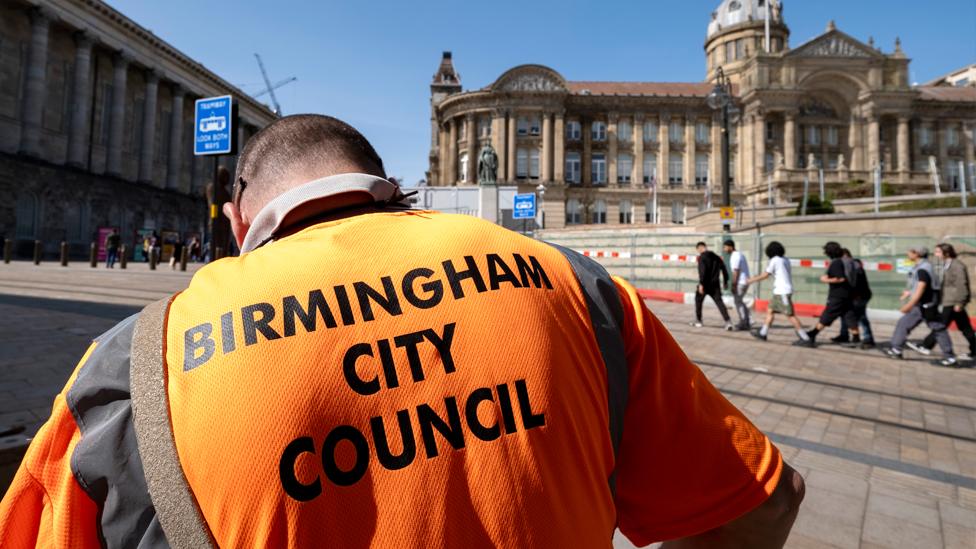
The council is facing a £760m equal pay bill
As a result of the inability to balance the books, it earlier this month announced all new spending would cease, although services it has a statutory duty to provide - including education, social care and waste collections - will continue.
Two months before the issuing of that Section 114 notice, which formally outlined the constraints, the council said it had taken the decision to stop spending on all "non-essential" services. What those are have yet to be announced.
Mr Gove has appointed Max Caller as the lead commissioner, a previous adviser to the city who has since said hosting the Commonwealth Games in Birmingham was a "mistake".
A former chief executive of the London boroughs of Hackney and Barnet, Mr Caller was the lead commissioner into the recent intervention at Slough Borough Council, and was previously lead inspector for best value inspections at Liverpool and Northamptonshire councils.
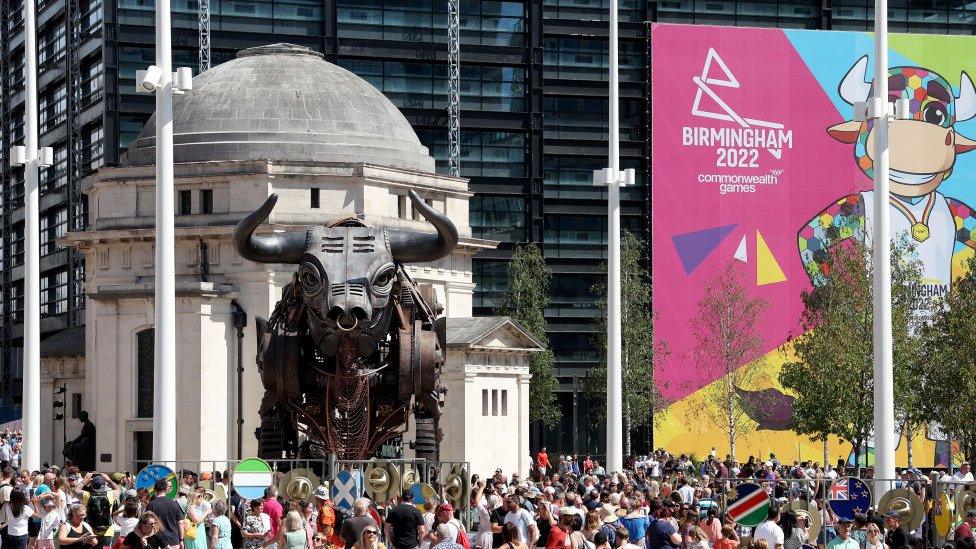
The Commonwealth Games was hailed as the start of a so-called "golden decade" for the city
Mr Street said the council's situation was an "avoidable tragedy" but added he fully supported the government's intervention.
"What is mission critical now is for the commissioners to work with the council to protect services for residents and businesses across the city," he said in a statement.
"Both should work in tandem to address the equal pay bill as quickly and effectively as possible to get the council back on a secure financial footing."
He said the review must be "rigorous in identifying and then resolving the underlying cultural and process failings in the council once and for all".
While he suggested selling off assets to pay its huge bills, Mr Street warned against selling cultural assets such as the city museum and art gallery or Aston Hall.
An extraordinary general meeting of the full council is due to be held next Monday to discuss a financial recovery plan.
In a report released ahead of it, external, chief executive Deborah Cadman said work to address problems "must be urgent, will involve hard choices about what we deliver and how we operate and will result in a smaller organisation".

What is a Section 114 notice?
Under the Local Government Finance Act 1988, if a council's chief financial officer believes the authority cannot meet its expenditure commitments from its income, they have to issue such a notice
They do not need the consent of councillors to do so
Local authorities in the UK cannot go bankrupt but the issuing of the notice is often described as "being effectively bankrupt", meaning they cannot make new spending commitments and must meet within 21 days to discuss next steps
No new expenditure is permitted with the exception of funding statutory services, including safeguarding vulnerable people, but existing commitments and contracts will continue to be honoured
Most councils in such a position pass an amended budget, reducing spending on services
Thurrock, Croydon, Slough and Northamptonshire have issued section 114 notices in recent years
(Source: House of Commons Library, external)

The council has already paid out more than £1bn in compensation to underpaid workers.
The settling of claims in 2012 followed a court ruling that found hundreds of mostly female employees, working in roles such as teaching assistants, cleaners and catering positions, missed out on bonuses given to staff in traditionally male-dominated roles such as refuse collectors and street cleaners.
In June, it emerged there was a further £760m equal pay liability - a sum equivalent to the entire annual spending on services and no means to meet the bill.
Financial support from the government could take the form of permission to borrow money to service debt, or sell assets, such as buildings and land, to raise cash to deal with its financial liabilities.
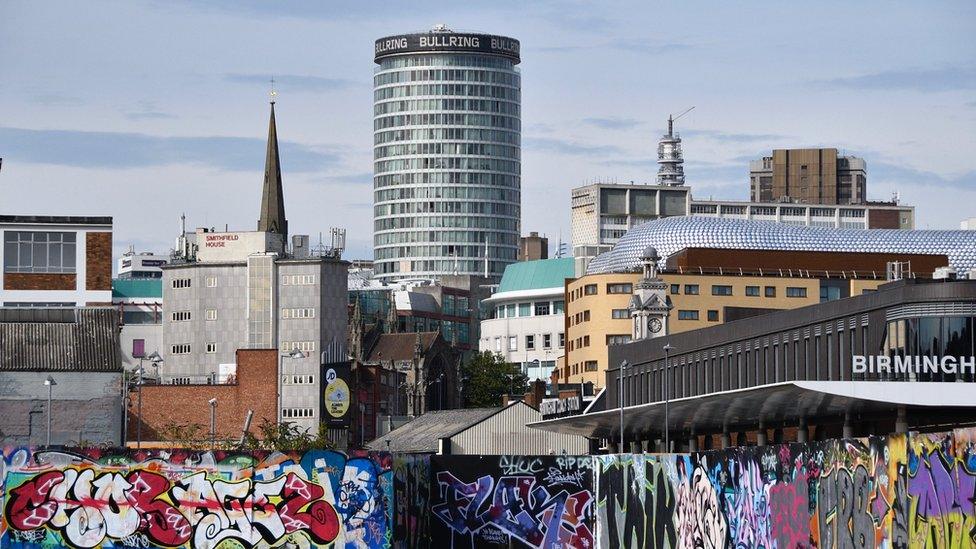
Council tax could be raised in the city, Mr Gove said
Prof Tony Travers, visiting professor in the London School of Economics' Department of Government, told the BBC selling off assets "would not provide money immediately to relieve 'annual' budget pressures".
But he said the government had in the past allowed Birmingham to "capitalise" spending earmarked for equal pay, meaning the council could use the money from asset sales to cover such liabilities.
Councillor Robert Alden, leader of the Conservative opposition in Birmingham, said residents deserved better and called for more transparency from the authority over equal pay claims.
The Labour administration had "failed to get a grip" of the issue, he said, adding that they had not listened to the opposition, officers, auditors or trade unions.
"They have put their heads in the sand instead of facing up to the mess they've made," he said.

Analysis by BBC Midlands correspondent Navtej Johal
The Secretary of State's rebuke of Birmingham City Council's leadership was stinging.
He criticised the culture at the top of the authority and said in an era of senior leaders coming and going, "the one constant has been a failure to deliver for residents".
Just a year ago, the city was basking in the glow of hosting the Commonwealth Games - a tournament which the council said would herald a "golden decade" for Birmingham.
Now, some residents have been walking the streets wondering which of the city's crown jewels will have to be sold off to balance its books.
Among other measures to address the financial woes, an increase in council tax has been suggested in a report released ahead of Monday's council meeting.
But that will fall on people who are already dealing with a cost of living crisis.
And although the council leader has said the authority will "continue to be on the side of our residents" there are worries that those who are struggling the most will be hardest hit by the cuts that are on the way.

The GMB union called on the authority to compensate women affected by inequalities in pay.
"The quickest, cheapest and fairest way to get a grip of the crisis in Birmingham is to work with GMB to end the discrimination and [to] compensate the women," said Rhea Wolfson, the union's head of industrial relations.
Meanwhile, Unite warned it would fight any attempt to cut jobs of its members at the council ahead of the commissioners' takeover.
General secretary Sharon Graham said: "No-one should be under any illusion, Unite will never sit back and allow our Birmingham city council members' jobs to be sacrificed to pay for others' failures.
"If there is any attempt to cut the jobs, pay or conditions of our members, Unite will fight those proposals using every resource available to the union."

Follow BBC West Midlands on Facebook, external, Twitter, external and Instagram, external. Send your story ideas to: newsonline.westmidlands@bbc.co.uk, external
- Published19 September 2023

- Published17 September 2023

- Published6 September 2023
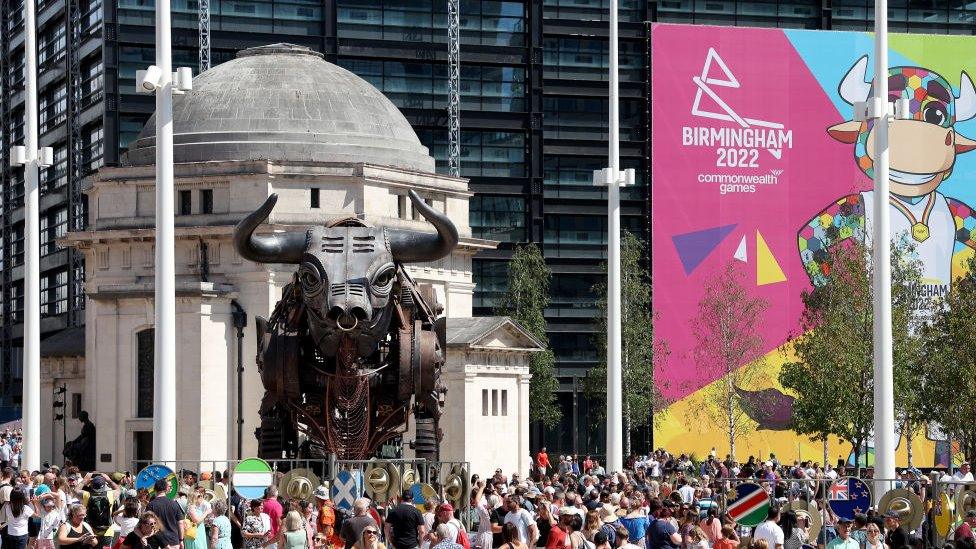
- Published5 September 2023

- Published7 July 2023

- Published20 June 2023
